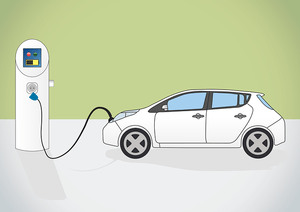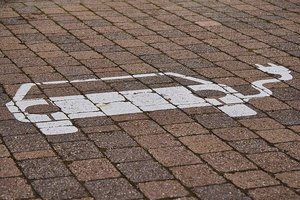
The electric vehicle revolution: How our homes are driving the green transition
Electric vehicles are driving the UK’s green transition, helping the nation on its journey towards sustainability and net zero emissions by 2050. To achieve this goal, the sale of new petrol and diesel cars will be banned after 2030, meaning that the future roads are guaranteed to look more electric.
But with the increase of electric vehicles comes the issue of charging. Of course, it makes sense that we should all be able to charge our cars at home. Nipping to the petrol station during the rush hour commute will be no more, as recharging will be done on our doorsteps. But do you have an electric vehicle charger at your home yet? The answer is most likely no. After all, we’ve not had much use for them up until now.
At some point, we’ll all need to upgrade our homes to be compatible with new electric cars. But with a rapid increase in the use of electric vehicles, how can our homes sustain the electricity demand? It’s clear that our homes will become central to the green revolution, even on the roads.
What’s the charge?
 There are over 35,000 charge points across 13,000 locations in the UK. This means that there are now more public places to charge than there are petrol stations. However, the time it takes to charge can vary between 30 minutes and 12 hours, depending on the size of the car battery and the efficiency of the charging point.
There are over 35,000 charge points across 13,000 locations in the UK. This means that there are now more public places to charge than there are petrol stations. However, the time it takes to charge can vary between 30 minutes and 12 hours, depending on the size of the car battery and the efficiency of the charging point.
It’s clear that the solution for electric vehicle charging lies at home. Leaving your car on charge overnight while it sits parked on the driveway or in the garage means that you’ll never fall on an empty tank again. But how much will your electric car contribute to your home electricity expenses? The answer: less than your petrol or diesel costs and with the added benefit of being more environmentally friendly.
In fact, on average, electric cars cost 4p per mile while petrol cars cost 9p per mile to run. This means that petrol cars cost over twice as much to run in comparison to electric cars. So, shifting your petrol costs to your home energy costs may boost your home bills, but you’ll be saving in the long run. Even better, charging your car from your home has additional environmental benefits. The
ban on new non-electrified cars aligns itself with the target to power all UK homes with wind by 2030. So, we can rest happy knowing that our cars will be charged with renewable energy at home.
Steering homes towards sustainability
It’s not only our roads that are becoming more sustainable. Our homes are quickly becoming leaders in the green transition, finding more sustainable ways to improve energy efficiency, use more renewable electricity, and lowering our home expenses. Charging your electric car could instantly become an act of environmental proactivity when you install solar PV panels on your roof. In fact, PV panels are quickly becoming a popular option for homeowners to lower their home energy costs and reduce their environmental impact. Estimates suggest that you could save around £270 a year on your energy bill when using a PV system.
The average UK driver had a mileage of 7,090 miles in 2019. If your electric car costs 4p per mile, this means your annual electricity cost would be £283.60. This is close to the annual savings on your energy from a PV system. Of course, to charge your electric car at your existing property, you will need to install an electric vehicle charging port. The average cost of which is £450 after financial assistance from the Electric Vehicle Homecharge Scheme. Even then, the long-term savings are worth the investment. So how will our homes of the future be designed for the future of electric vehicles?
Ready for the future
 It’s expected that 80 per cent of electric vehicle charging will take place at home. As such, the government has outlined proposals to change building regulations in England to require all new-build homes to be fitted with an electric car charging point. However, some housebuilders already offer the opportunity to install electric vehicle charging ports on your new home. St. Modwen Homes believes that electric vehicle charging points don’t just offer convenience to homeowners, but helps their customers be more environmentally friendly.
It’s expected that 80 per cent of electric vehicle charging will take place at home. As such, the government has outlined proposals to change building regulations in England to require all new-build homes to be fitted with an electric car charging point. However, some housebuilders already offer the opportunity to install electric vehicle charging ports on your new home. St. Modwen Homes believes that electric vehicle charging points don’t just offer convenience to homeowners, but helps their customers be more environmentally friendly.
It’s never been easier to make your new home eco-friendly, and now St. Modwen Homes can help people choose more sustainable options in their life. Installing an electric vehicle charging point on your home can help you save money, reduce your environmental impact, and ensure that your home is prepared for the future. St. Modwen Homes offer a variety of eco-friendly home upgrades for customers, meaning that alongside electric vehicles, the future of our homes is truly sustainable. The use of PV panels, air-source heat pumps, and wastewater heat recovery units can further help us to lower our costs and boost sustainable lifestyles. The construction of new-build homes, whether they’re houses in Eastwood or new-builds in Wantage, should recognise the needs of the future and adapt to meet them.
Future roads belong to electric vehicles, but our homes will spearhead the route through the green transition, making their use viable for the next generation of homeowners. As we continue our sustainable journeys, the purpose of our homes and vehicles will change. From simple transport and accommodation, new cars and new homes are allowing us to lead sustainable lifestyles in ways which have previously been impossible.